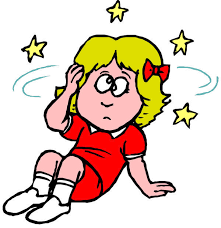FOR MY BIGGEST WINNER TEAM
or anyone that is having problems with getting light headed.
Light Headed

Light Headed
Features:
The sensation of feeling
lightheaded is similar to feeling dizzy but without the sensation of the room
spinning. Feeling lightheaded often feels like you are just about to faint. The
main mechanism that leads feeling lightheaded, regardless of the underlying
cause, is lack of blood flow and oxygen to the brain. Other symptoms such as
dizziness, fatigue and confusion can accompany the sensation of feeling
lightheaded.
Causes:
Simple causes for feeling
lightheaded can include dehydration, lack of food and overexertion. Lack of
fluids in the body can cause the blood pressure to drop, which makes it
difficult to get oxygen-carrying blood to your brain. Not eating enough can
lead to not have enough glucose in your blood, a condition known as
hypoglycemia. Your blood glucose, commonly referred to as your blood sugar, is
the body's main source of fuel and you cannot function properly if your level
falls too low. If you are overexerting yourself while exercising, your lungs
and heart cannot get blood and oxygen to your brain fast enough, which can lead
to feeling lightheaded. The same is also true if you are fatigued. In some
cases, a more serious underlying condition may be responsible. Heart problems
and high blood pressure are two common ailments that can make you feel
lightheaded, especially during exercise. In addition, some medications can
cause lowered blood pressure, which can lead to feeling lightheaded.
Prevention:
Eat a smaller meal two to four
hours before exercising to give your body the proper amount of fuel. If you
forget to eat, consume a small snack no fewer than 30 minutes before
exercising. Start to hydrate the day before strenuous exercise. Drink 1 to 3
cups of water right before exercise, and consume plenty of water during and
after exercise. Drink a sports drink or water enhanced with electrolytes if you
are participating in vigorous exercise. Get plenty of rest, and keep an even
pace while exercising as heavy breathing during exercise increases your risk of
feeling lightheaded. A general rule is if you can't talk and hold a
conversation while you are exercising, you are working too hard.
Treatment:
As soon you start to feel
lightheaded during exercise, stop what you are doing and lie down so your head
is level with your heart. This will allow for easier blood flow to your brain,
which will get rid of the lightheaded feeling. Consume a small snack high in
sugar or carbohydrates, such as orange juice or peanut butter and crackers, if
you suspect hypoglycemia. Drink several cups of water to ensure proper
hydration. If the lightheaded feeling continues despite rest and self-care,
seek immediate medical attention.
Low
Blood Sugar: Many people
tend to eat less prior to a workout to prevent the discomfort of a full
stomach. This especially applies to people who work out in the morning and
assume the dinner from the night before will supply enough energy to exercise.
The meal you ate eight to 12 hours before a workout will not provide adequate
energy. You should eat a small snack high in carbohydrates within an hour
before a workout. Bananas, whole grains, energy bars, milk and juice are
excellent options to raise your blood sugar and avoid feeling lightheaded. Low
blood sugar is a major cause for dizziness and fainting, so it is vital to fuel
your body properly prior to exercising.
Dehydration:
Sweating and activity cause your
body to lose water, and if you are losing more than you put in, you will become
dehydrated. Drinking a bottle of water at the gym may not be enough if you are
already dehydrated prior to beginning your workout. If you feel thirsty at any
point during the day, you should drink water or other clear liquids to keep
your hydration up. Staying hydrated throughout the day could alleviate
lightheadedness during exercise. Dehydration can also cause low blood pressure
in some people, leading to severe lightheadedness and fainting.
Overexertion:
When you feel lightheaded during
a workout, it may be your body’s way of saying “slow down.” The reason for
exhaustion may be due to the workout being too intense, stress, underlying
illness or simply a lack of energy. Overexertion may also cause muscle
weakness, headaches, cramps and heart palpitations. If you suspect you have
pushed yourself too hard, slow your pace and drink water. You may also want to
sit down and elevate your feet to improve circulation, which will help
alleviate the lightheaded feeling.
Underlying
Health Issues: Occasionally,
lightheadedness while exercising can be caused by an underlying health issue
such as heart disease. If you experience pain in your arms, jaws or chest, stop
exercising immediately as this could be a sign of a heart problem. Another
health issue that could cause lightheadedness during exercise is decreased lung
function due to a blood clot, infection or other lung-related illness. Stop
exercising if you feel like you are unable to get a good breath or if you have
pain in your lungs. In these instances, it is advisable to seek medical care as
soon as possible. Even in the absence of additional symptoms, lightheadedness
warrants a trip to your doctor for a checkup to ensure that you are able to
exercise safely.
I hope this helps for you! Let me know if it was useful!
I hope this helps for you! Let me know if it was useful!

No comments:
Post a Comment
I love comments! Let me know what you think of this post!